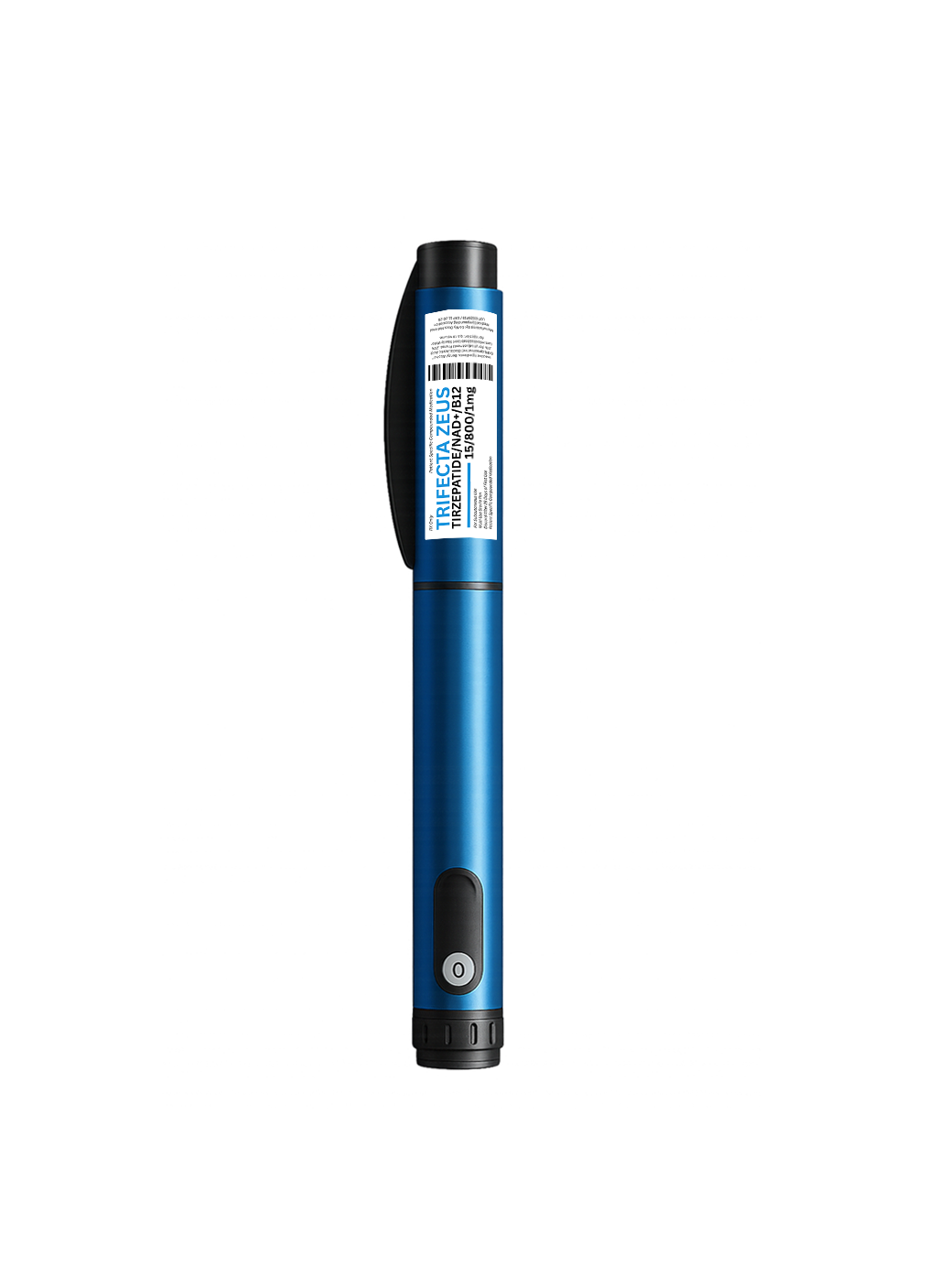NAD+ is the unsung co-pilot of metabolism—moving electrons, making ATP, and helping your mitochondria keep the lights on. If you’re exploring NAD+ for weight loss, you’ll want the science on how it supports energy, especially when calories are tight.
This guide is for busy people on a weight-care journey (including those considering GLP-1/GIP therapy) who want a clear, evidence-based explainer—with a light intro to the Trifecta Zeus Pen.
Key Takeaways
- NAD+ is central to cellular energy and mitochondrial function. CellNature
- Calorie restriction shifts cellular pathways where NAD+ and sirtuins play key roles in adaptation. Frontiers
- Tirzepatide (Zepbound®) is FDA-approved for chronic weight management; compounded alternatives aren’t FDA-approved and face added regulatory scrutiny. FDA Access DataReuters
- The Zeus Pen (tirzepatide + NAD+ + B12) is offered via clinician review and U.S.-licensed, LegitScript-certified pharmacy fulfillment—appropriate for some, not all.
What NAD+ actually does (and why it matters for energy)
Think of NAD+ as your cell’s charge carrier. It shuttles electrons from food into the mitochondrial electron transport chain to make ATP—the usable “currency” of energy. Without robust NAD+, oxidative metabolism slows. CellNature
Quick hits
- Powers mitochondrial ATP production
- Supports redox reactions across carbs, fat, and protein
- Serves as substrate for repair/maintenance enzymes (e.g., sirtuins, PARPs) Cell
NAD+ for weight loss: where it fits
“NAD+ for weight loss” isn’t a magic switch—but during fat loss, your cells lean on efficient mitochondrial metabolism and stress-response pathways. Higher NAD+ availability is tied to sirtuin signaling that helps cells adapt to low-energy states. Frontiers
Potential benefits people seek (evidence varies)
- Smoother energy during calorie cuts
- Better workout recovery and metabolic flexibility
- Support for cellular maintenance pathways under stress Frontiers
Support during calorie restriction
Calorie restriction (and CR-like states) increases reliance on NAD+-dependent enzymes (notably sirtuins) that govern fuel use and cellular housekeeping. This is one reason NAD+ biology shows up in many CR and longevity discussions, even if direct weight-loss outcomes from NAD+ alone remain unproven. Frontiers
Good to know
- CR tends to favor pathways that are NAD+-sensitive
- Cellular benefits ≠ guaranteed fat loss; human outcomes data are still emerging
Why the Zeus Pen includes NAD+
Tirzepatide aids weight management by activating GIP and GLP-1 receptors, helping reduce appetite and improve metabolic parameters. Adding NAD+ (plus B12) in a single weekly pen is designed as an adjunct to support cellular energy during active weight loss—especially when you’re training, eating less, and asking more of your mitochondria. (It’s a supportive concept; outcomes can vary.) FDA Access Data
Intended support targets
- Energy metabolism while in a calorie deficit
- Nutrient sufficiency (B12) during appetite reduction
- Habit-friendly, once-weekly routine
Thinking about GLP-1/GIP therapy with tirzepatide?
Start online. Complete a short, secure medical form, and a licensed physician in your state will review your health history to decide whether the Zeus Pen (tirzepatide + NAD+ + B12) is appropriate—and, if so, what starting dose makes sense for you. Not everyone is a candidate; eligibility is determined by the reviewing physician. If prescribed, your Zeus Pen is prepared by a U.S.-licensed, LegitScript-certified pharmacy.
Important safety context
- Zepbound® (tirzepatide) is FDA-approved for chronic weight management; it carries a boxed warning about thyroid C-cell tumors (seen in rats) and has contraindications—review labeling with your clinician. FDA Access Data
- Compounded GLP-1/GIP products are not FDA-approved; regulators have increased scrutiny of illegal or unverified ingredients—use reputable, inspected channels only. Reuters
What to pair with any plan
- Protein-forward nutrition and fiber
- Resistance + zone-2 training
- Sleep and stress basics (they modulate appetite and recovery)
Bottom line
If you’re exploring NAD+ for weight loss, think “cellular support,” not “silver bullet.” The clearest human data show oral NR/NMN can raise NAD+; early parenteral studies map pharmacokinetics more than outcomes. For medical therapies like tirzepatide, stick to clinician-guided care and vetted pharmacies—and consider NAD+ as a complementary, mitochondrial-friendly layer. Queen's University Belfast




